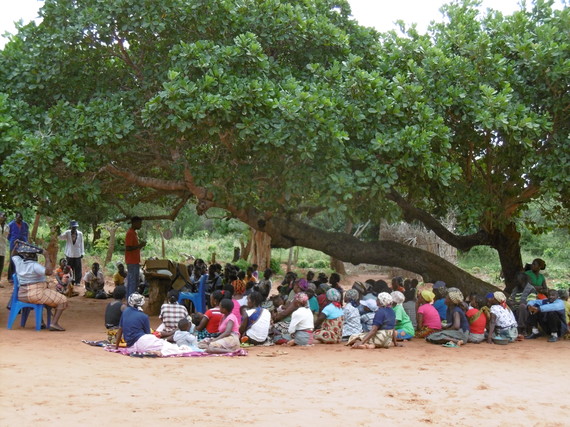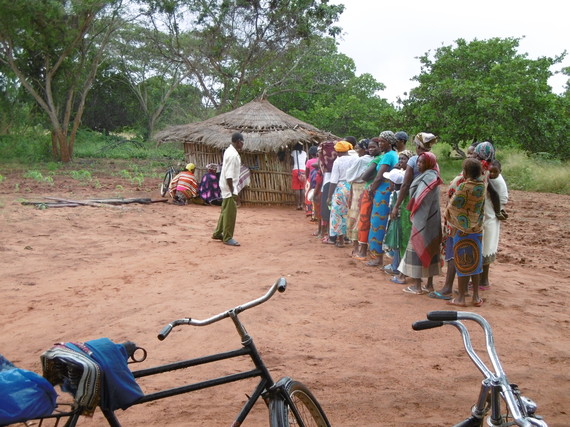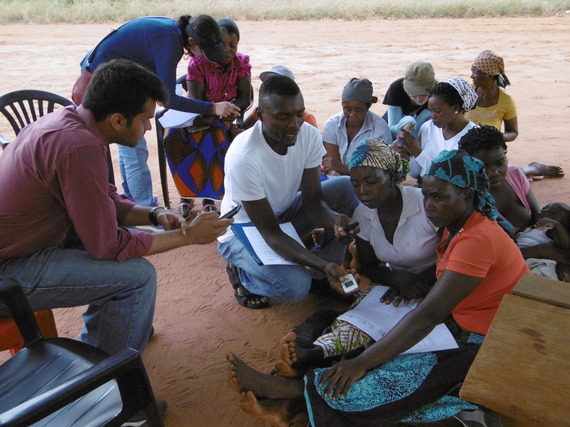
On April 7th, I visited Mucambe-Feha a small community in Mozambique far away from any city. The closet city of Morumbene is 55 km away accessible by dirt road. This is also the closest hospital they have access to. As we arrived in our 4x4 wheel drive, the first image that we saw was of a giant tree, under the shade of which, sat almost up to 100 women with small babies tied to their backs using the traditional Mozambiquen cloth called Kapulana.
This tree (above) and a small hut (bottom) doubles up as the primary healthcare center for this community.
A healthcare worker was addressing this group of 100 women as part of monthly HIV counseling sessions. This is one of the biggest problems in Mozambique and also a prime factor responsible for infant mortality and poor maternal health besides Malaria. I was eagerly waiting for the health worker to finish his training session so that my Mozambiquen colleagues who work with him can introduce me to him. As soon as this session finished, I introduced the community health workers to our new SMS software tool - Connect the Dots. Connect the Dots is a simple tool that helps community health workers send data through SMS texts to a secure website. Decision makers and policy makers can monitor these data in real time and determine progress in projects even in remote communities. They can also intervene when necessary and this overall increases the accountability of projects and improves the efficiency of public health programs.
My team and I had been working on this for last six months in USA. Last 2 weeks before visiting this community we tested the SMS system on our local phones in Mozambique. It worked. It was time to test it with people who are actually going to use this tool. I paid 20 Meticals (66 cents approximately) to a local community health worker to use his phone for testing purposes. I had to send an international SMS in a particular format to a special number that is connected to a cloud server in USA. Whatever we have been working for last 6-8 months comes down to these 160 characters from a simple outdated Nokia phone. My blood pressure was elevated for two reasons, I was scared if this is going to work or not and I was severely dehydrated. Guess what?
It didn't work. This isn't the worst part. We have no idea why it didn't work. You can fix the problem if you know what the problem is. As of now the only thing we knew was, was that our software works fine with MCel network and in this village everyone uses Movitel, since that's the only available mobile operator and it doesn't work with our software, "yet."
Also, before I can troubleshoot anything more it started raining heavily. Rain or shine, tree is the only protection you have from these elements. But it rained too heavily, for even the tree to keep us dry under it's large spread out of leaves and branches. So we used the plastic chairs on our head, to stay dry. It didn't look like the rain is going to stop anytime soon, and I was dejected that I was not able to trouble shoot anymore or talk to health workers in these conditions. We decided to start driving back and maybe come back some other day when we can actually work.
This visit was a failure when it comes to our software. But in fact it was not. It was good to learn so early in our implementation cycle that something is wrong. On the way, I kept thinking how we could make this work especially in a remote community like this. After returning back to our base camp in the city of Maxixe, about 75 km far from this village. I discussed this with our two software development interns who are the chief architects for building this tool. We scratched our heads for next 2 weeks trying to trouble shoot. After step-by-step testing and troubleshooting our code and using the Holmes' deductive thinking we realized there has to be something wrong with the mobile operator in that region. And yes it was. But we still didn't know the solution to this problem.
We were back on the road after two weeks. It was a good shiny day and the healthcare workers were going to walk or bike many miles to meet us. We reached the place - same tree and only less people this time. We kicked-off the meeting with prayers to God, a ritual practiced in every meeting here. Amen! After the prayers, every health worker introduced their name and what church they belong to. An interesting thing, every Sunday they go to different churches - Catholic, Methodist, Lutheran, etc. but when it comes to serving their community members, they are all united by the same mission. After introductions, it was time for me to take the stage and introduce our system. And just then the light bulb went ON. I found a simple solution to the complex problem that we have been trying to solve for last 2 weeks. Since the network operator in this region is restricting the health workers to send SMS to international number, they can just send the messages to my local Mozambiquen number instead. And from that point, I can push the messages to our international number, a part of the loop, that we know works for sure. Finally, everything was working. Now the health care workers were going to use this tool to record and manage the information for pregnant women in their community. As our public health advisor Dr.Arlindo summed it up when he said, "Pregnancy is not a disease and no one should die of it."
This is just the beginning of what seems to be a long muddy road towards better healthcare.



